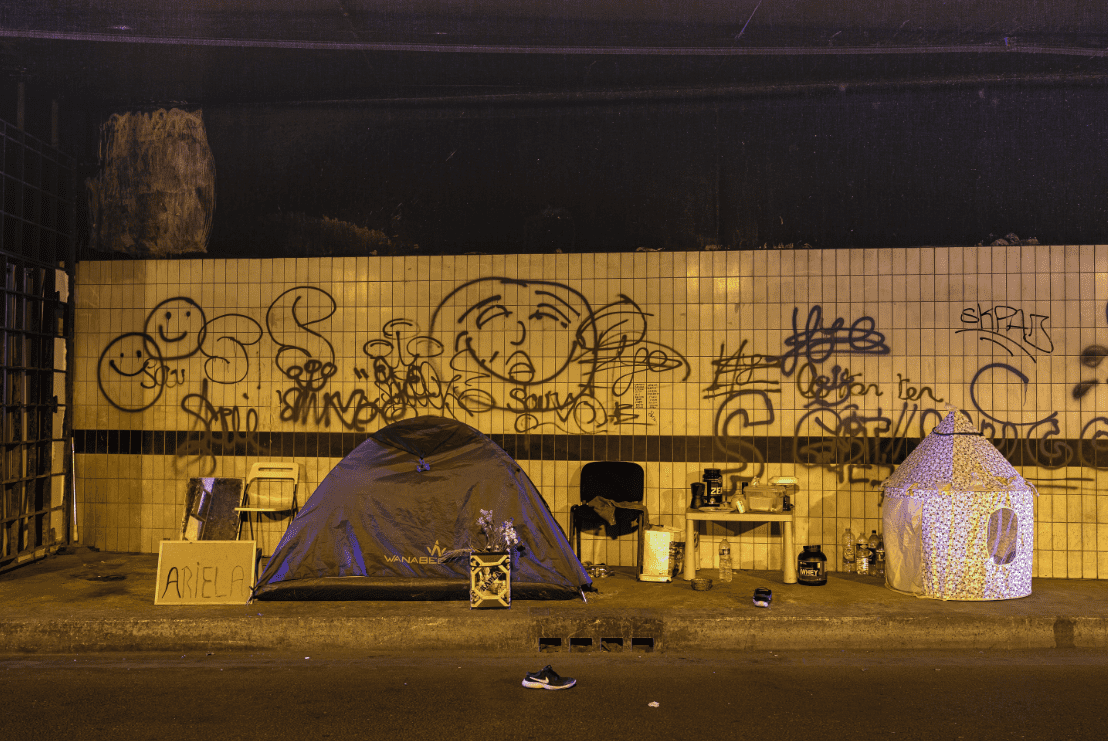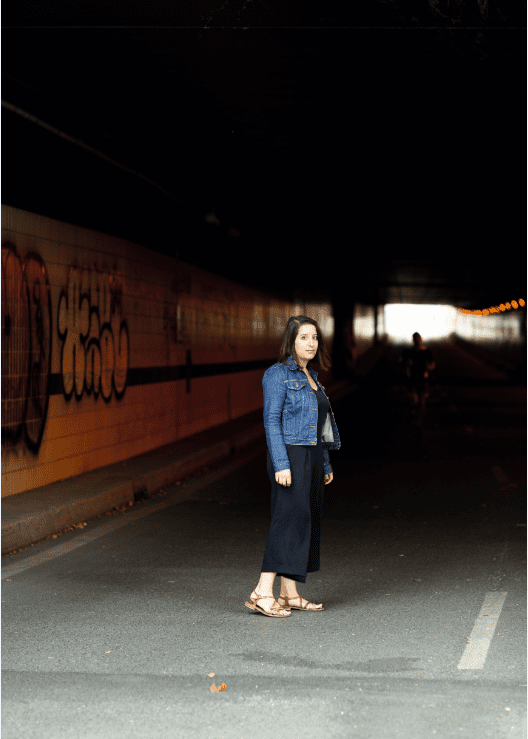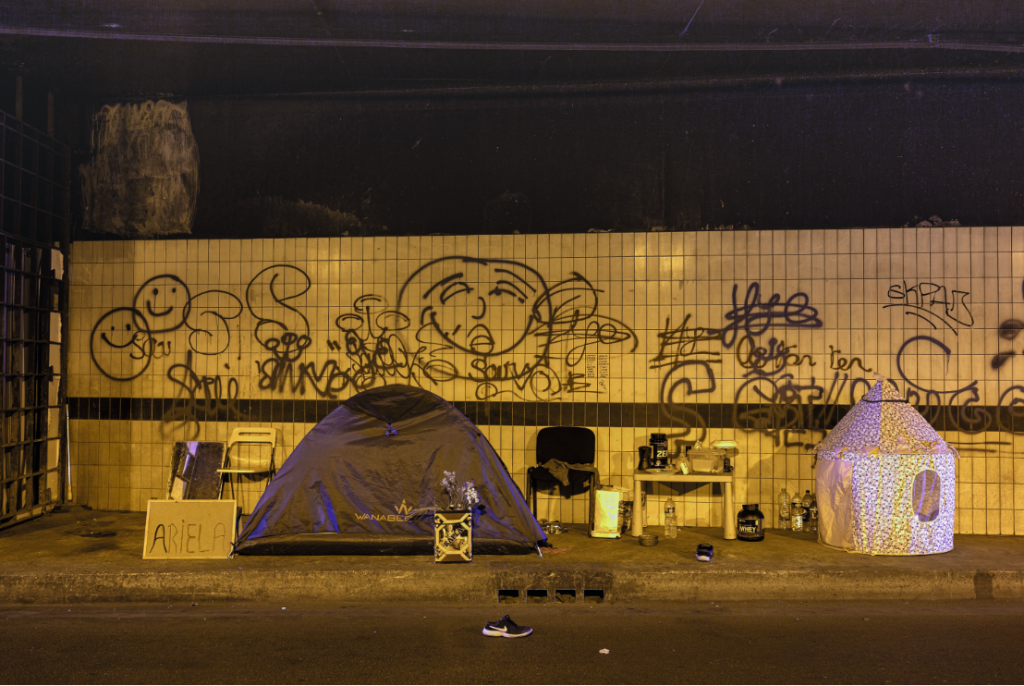Ariane Mohseni: “I wanted to give homeless people a voice.”

Ariane Mohseni (H.16) followed a path that was both traditional and brilliant: preparatory class, HEC, a job in the financial sector… Until the day when she left everything behind to make a social documentary in the United States.
My father is Iranian; he came to France as a student. After a preparatory class, he studied at the Ecole des Mines in Paris (Mines Paris Tech). I can’t say that I’m the daughter of an immigrant who struggled! My mother is a psychologist. She instilled in me the idea that no matter what I do, the most important thing is for me to be happy. On the other hand, my parents paid a lot of attention to my schoolwork. My father, especially, demanded that I was always the best, and I felt considerable pressure.
Not knowing exactly what I wanted to do with my life, I decided to enroll in a business-oriented preparatory class. Like many people, I felt that a business school would give me a lot of options. Three years later, therefore, I entered HEC, and in 2014 I did my first financial-markets internship at Société Générale. I found the work to be intellectually challenging, but it wasn’t for me. My stomach was in knots every day…
“One day, Lalita called me to tell me that we had just been awarded a $15,000 grant. I couldn’t believe it! This was the boost I needed.”
What I really enjoy is meeting people, talking with them, hearing their stories. So, clearly, a job that kept me behind a computer screen didn’t suit me at all. At the same time, I felt (and still feel) that growing up means, perhaps, accepting a traditional job, earning a living, producing something… Doing what everyone else does, in other words! During my internship, I volunteered with Samu Social emergency services. At the beginning, I thought I would go there only occasionally, but then I found myself spending three nights a week at the center. I couldn’t leave.

That was when I began to think about doing something related to the homeless. I wanted to give them a voice, but I didn’t yet know how. I had been filming things with my father’s camcorder since I was a little girl. I had no technical knowledge, but I loved doing this. After talking with Lalita, a journalist friend of mine, I began to have an idea about a film. Lalita was working as a freelancer in Washington and she explained that this city was the ideal place for a project on the homeless. I did some research and discovered that the United States capitol is both a major power center and one of the poorest urban areas in the country. So, it did make sense to do such a project there.
More experienced that I was in writing stories and articles, Lalita knew that we needed to narrow down our subject before beginning such a project. Every night when I came home from my work with SAMU Social, I would call her so that we could discuss all this. We soon realized that when we talked with the homeless, they always mentioned romantic relationships. This subject came up all the time. How can you find someone when you’re living on the street? How can you have a little intimacy? Does it help to be a couple, because two people are stronger than one? Or is it the opposite, if for example there are addiction problems, can that drag you down? We had our subject: love among the homeless!
I had three months free between my two internships and I went to Washington. We visited all the shelters and food-distribution centers and slowly earned people’s trust. But at that point we had absolutely no financing at all. We soon came into contact with an association that produced a newsletter written by the homeless, and we led a workshop on writing about love.
One day, this association told us: “We can loan you a video camera and microphones, and you can do what you want with them.” So, we began to interview homeless people and film them… If I have to pick one moment when my life changed, it would be that one. I had ideas, of course, and I knew that I didn’t want to spend my life working in the financial sector, but I hadn’t had any definite project in mind. And there, in Washington, I felt for the first time that I was where I was supposed to be.
“How can you find someone when you’re living on the street? How can you have a little intimacy? Does it help to be a couple, because two people are stronger than one? …”
We were extremely excited to be doing what we were doing and we worked day and night without ever feeling tired. The three months passed and I had to leave to begin my second internship, with Deutsche Bank in London. It was to be what we call a “summer”, after which you have a chance to be given a permanent job, but there is enormous pressure to be chosen for such a position. The atmosphere in London’s City is a lot more aggressive than in Paris. Everyone was competing with everyone else all the time, and I felt even less like I belonged there. Even so, I committed myself, and after three months I was given the coveted offer of a job.
Then I went home to Paris for Christmas. I only had six weeks of classes at HEC left to do, and the job in London was to begin in June. I took advantage of this to return to Washington and continue working on the project there. We began to apply for financial grants. Then it was summer and I moved to London. Strangely, I did not feel comfortable with the permanent contract I had been given, because it has no end. It’s up to the employee to decide to leave.
From finance to financing
One day, Lalita called me to tell me that we had just been awarded a $15,000 grant. I couldn’t believe it! This was the boost I needed. One week later, I quit my job. It was much harder to convince my parents that this was the right choice. My father was beside himself! The financial-markets sector is one where people can make a lot of money very quickly. My parents were worried about my giving up the chance of a comfortable life in order to make films. Finally I returned to the United States for the third year in a row.

I had never felt more at home, but on the other hand I had never worried as much about my abilities, and whether I was qualified to do what I was doing. So, I returned to France to enroll in a year-long training program, and during this time I worked on different audio and video projects, some of which are still in progress. Since then I’ve continued working on my own projects, totally independently, which I don’t mind at all!
Lalita and I are making another film, on abandoned areas in America, and I’m also writing a thesis on social transformation and new forms of political action. I was lucky enough to be accepted into a doctoral program even though I had not studied sociology at university, and I think this was in part thanks to HEC. Attending HEC shows that a student is serious, and this opens many doors. Today, if I had it all to do over again, I would do… exactly the same thing!
I would even spend time working in the financial sector. In fact, it was interesting to learn about this world and to experience life in the City. It’s relevant to the social issues that interest me. It’s also reassuring to know that someday, if I want to, I can return to a more traditional kind of job. Most of all, giving up finance to try to make documentaries represented a real choice on my part. Maybe this was even more meaningful for me than if this vocation had been imposed on me when I was 17 years old.
Published by Clémentine Baron

